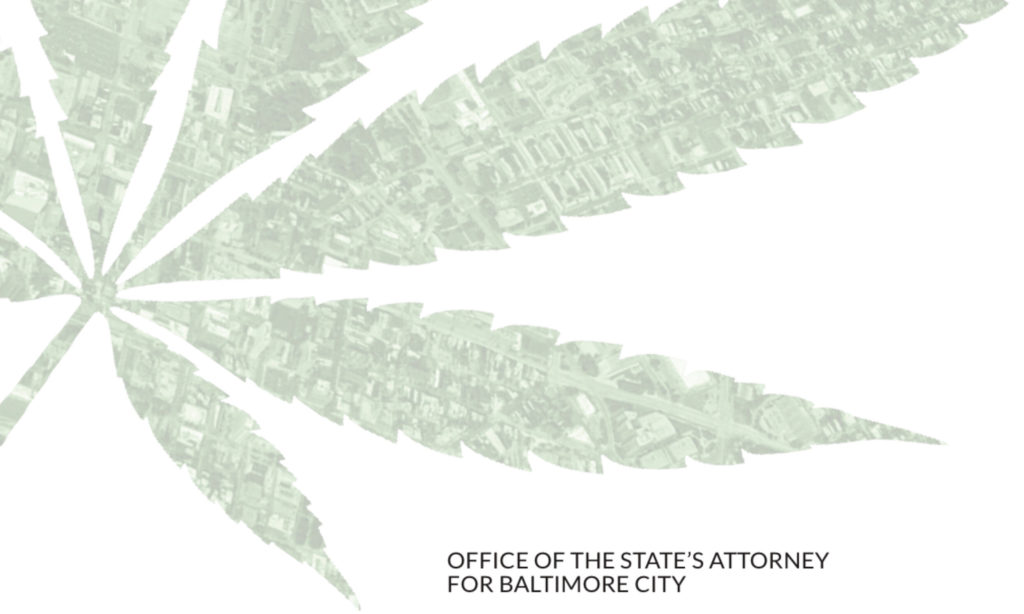On January 29, 2019, Baltimore City State’s Attorney Marilyn Mosby announced a major shift in cannabis policy: The Baltimore City State’s Attorney’s Office (SAO) would no longer be prosecuting cannabis possession cases in Baltimore, regardless of weight or past criminal record.
“We need to get serious about prioritizing what actually makes us safe,” Mosby said when she made the announcement. “No one who is serious about public safety can honestly say that spending resources to jail people for marijuana use is a smart way to use our limited time and money.”
In Maryland, possessing 10 grams or less of cannabis without a medicinal card is decriminalized. Anything over that results in a charge of misdemeanor cannabis possession or possibly, possession with intent to distribute.
Mosby’s announcement received a great deal of press. The Outlaw Report learned that a New York Times reporter was contacted by Mosby’s office about this announcement. The Times was the first to report it and interviewed Mosby about the policy change one day earlier—and the SAO also released a policy paper titled, “Reforming A Broken System: Rethinking The Role Of Marijuana Prosecutions In Baltimore City.” This policy paper cited reporting I did for Baltimore Fishbowl one month earlier noting that since decriminalization, nearly 96% of arrests for cannabis possession were black (when I was doing my reporting on the racial disparities in 2018, the SAO declined to comment).
Now, more than a year after this major announcement, the results of that policy have significantly reduced the number of Baltimoreans charged with cannabis possession. According to the SAO, 219 cannabis possession charges were dropped since this policy was announced a little over a year ago.
Since decriminalization in 2014, cannabis possession arrests have landed somewhere between 300-400 people per year and have actually slightly increased in the past few years. The 219 arrests that did not result in prosecution are likely the majority of 2019’s arrests. The SAO, however, did not provide the total number of possession charges and suggested The Outlaw Report ask the Baltimore Police Department (BPD). BPD said they would provide the number but as of publication time, have not yet sent that information over.
Another way to look at these numbers: Despite the SAO’s policy and despite growing calls for cannabis legalization in Maryland, BPD still arrested at least 219 people for cannabis possession in 2019. This has created what CityLab referred to as a “‘catch-and-release’ situation with police continuing to arrest people for pot, only to be almost immediately freed by prosecutors.”
For such a high-profile announcement last year, the SAO was not particularly forthcoming about these numbers. The Outlaw Report first reached out back in January in anticipation of the results being evaluated one year into the policy. The SAO said they would get the information sent over and then did not. A second request in February promised the information, and again it did not arrive. The SAO finally sent the information last week but only after The Outlaw Report asked if it would take a Public Information Request to receive the information.
The Outlaw Report also asked for further clarification on how the SAO determines if someone in possession of more than 10 grams of cannabis is using it for personal use or not, but they did not respond. The SAO’s Marijuana Prosecution Policy reads, “BCSAO will prosecute distribution of marijuana as long as there is articulated evidence of intent to distribute beyond possession.” It describes clear articulated evidence as, “large amounts of cash on hand, evasive driving, packaging for sale, and possession of scales, packaging and baggies.”
Currently, Delegate Nick Mosby, who is married to Baltimore SA Marilyn Mosby, is sponsoring a House Bill 550, which would increase the decriminalization threshold in Maryland from 10 grams to one ounce and also make it so that possession of an ounce or more cannot be the only justification for charging someone with intent to distribute. At a HB 550 hearing, baggies and individual packaging were mentioned by Law Enforcement Action Partnership’s Neill Franklin as examples of evidence police often incorrectly and unjustly use to arrest people for intent to distribute.
On Thursday, March 9, HB 550 was given a favorable report with amendments.
Another aspect of the SAO’s January 29, 2019 announcement was that they would be removing nearly 5,000 convictions for cannabis possession going back to 2011 (1,000 Circuit Court convictions and around 3,800 from District Court).
“Jailing people for marijuana possession is a vast and ongoing moral failure,” Mosby said at the time. “Communities are still sentenced under these unjust policies, still paying a price for behavior that is already legal for millions of Americans. That’s why I’m moving to vacate these cases.”
Removing those 5,000 or so convictions has not happened. At the end of April 2019, Circuit Court Judge W. Michel Pierson (full disclosure: Pierson is named in a federal lawsuit regarding court transparency that I am involved in) and District Court Judge Kathleen Sweeney struck down Mosby’s requests. According to the Baltimore Sun, Judge Sweeney’s decision claimed that Mosby did not explain the “collateral consequences” of the cannabis charges.
Most devastating, Sweeney pointed out that Mosby, who has been the State’s Attorney in Baltimore since 2014, was asking to remove convictions, many of which she oversaw: “Now, this same State’s Attorney claims that drug enforcement in Baltimore City, presumably her own efforts, have had a disparate impact on African-Americans,” Sweeney wrote.
The SAO has not provided an update on its strategy for trying to remove these convictions.

